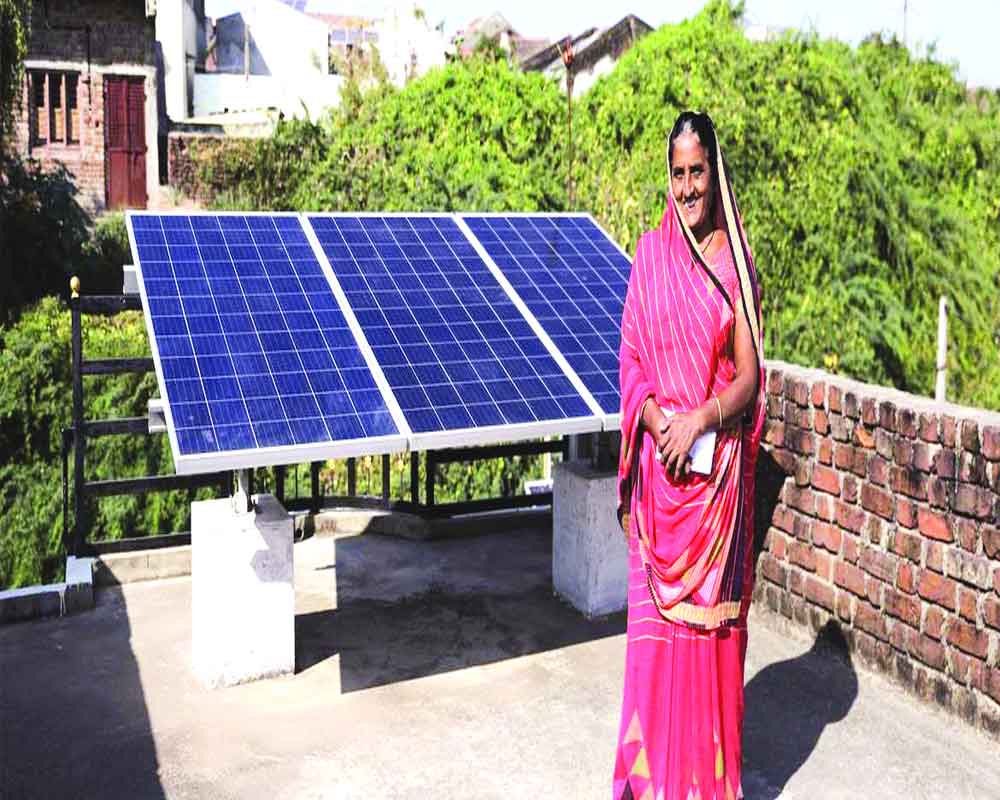The 'Pradhan Mantri Suryodaya Yojana' represents a significant step towards sustainable energy adoption, promising not only free electricity but also economic empowerment
Finance Minister Nirmala Sitharaman recently announced a groundbreaking initiative in her budget speech, confirming that participants in the government's newly unveiled rooftop solar scheme will receive 300 units of complimentary electricity per month. This initiative aims to assist households in saving up to Rs 18,000 annually, with distribution companies ensuring its implementation.
This announcement comes on the heels of Prime Minister Narendra Modi's declaration of the 'Pradhan Mantri Suryodaya Yojana' shortly after his return from Ayodhya on January 22. Under this scheme, rooftop solar power systems will be installed in one crore homes, though a specific timeline for achieving this ambitious target was not provided.
The scheme arrives at a crucial juncture as the government's goal of installing rooftop solar power plants has not gained significant traction. Despite a target of 40 GW by the end of 2022, only 5.87 GW of rooftop solar projects were installed by May last year, representing less than 15% of the target.
In alignment with the government's energy transition plans, a substantial portion of the renewable capacity, totalling 292 GW out of 500 GW by 2030, is expected to be solar power.
Additionally, the Finance Minister highlighted that the scheme will facilitate the adoption of electric vehicles (EVs) by incorporating home charging stations. It is also anticipated to generate entrepreneurship and employment opportunities in the supply, installation, and maintenance sectors.
The 'Pradhan Mantri Suryodaya Yojana' extends the longstanding rooftop solar energy program, which aimed to contribute 40 GW to the government's initial target of installing 100 GW of solar capacity by 2022. However, as of the end of 2023, the country's total solar capacity reached 73.3 GW, with grid-connected rooftop systems comprising only 11 GW, or 15%.
Industry experts, including the Delhi-based Council on Energy, Environment, and Water (CEEW), suggest that installing solar power on rooftops of 10 million homes could add 20-25 GW of new capacity. Furthermore, this initiative is expected to lead to savings of about Rs 2 lakh crore for distribution companies over the next 25 years.
Under the Pradhan Mantri Suryodaya Yojana, approximately 10 million households will benefit from the ability to sell surplus electricity to distribution companies. Sitharaman estimated that families could save between Rs 15,000 and Rs 18,000 annually through this project, with the Rural Electrification Corporation (REC) Limited serving as the designated nodal agency.
The scheme mandates the provision of 300 units of free electricity to low- and middle-income households. After recovering the installation cost of Rs 80,000 (post-subsidy) for a 2 kW plant in four years, the surplus power generated can be sold to the grid. Distribution companies stand to benefit from reduced infrastructure investment and losses.
While the project's implementation faces challenges, including limited panel manufacturing capacity, experts advocate for a focus on practical sectors such as commercial and industrial, where subsidies and clear policies can drive cost reductions. Despite previous shortcomings, the government remains committed to renewable energy targets, including the expansion of e-vehicle infrastructure and the promotion of green growth initiatives.
In conclusion, the 'Pradhan Mantri Suryodaya Yojana' signifies a pivotal stride towards a brighter, cleaner future for India. By harnessing the power of the sun, this initiative not only offers free electricity to millions of households but also paves the way for economic prosperity and environmental sustainability. With continued commitment from both the government and citizens alike, India is poised to emerge as a global leader in renewable energy adoption, driving positive change for generations to come. Let us embrace this opportunity to shape a greener, more prosperous tomorrow for our nation and the world.
(The writer is a senior journalist; views are personal)


























